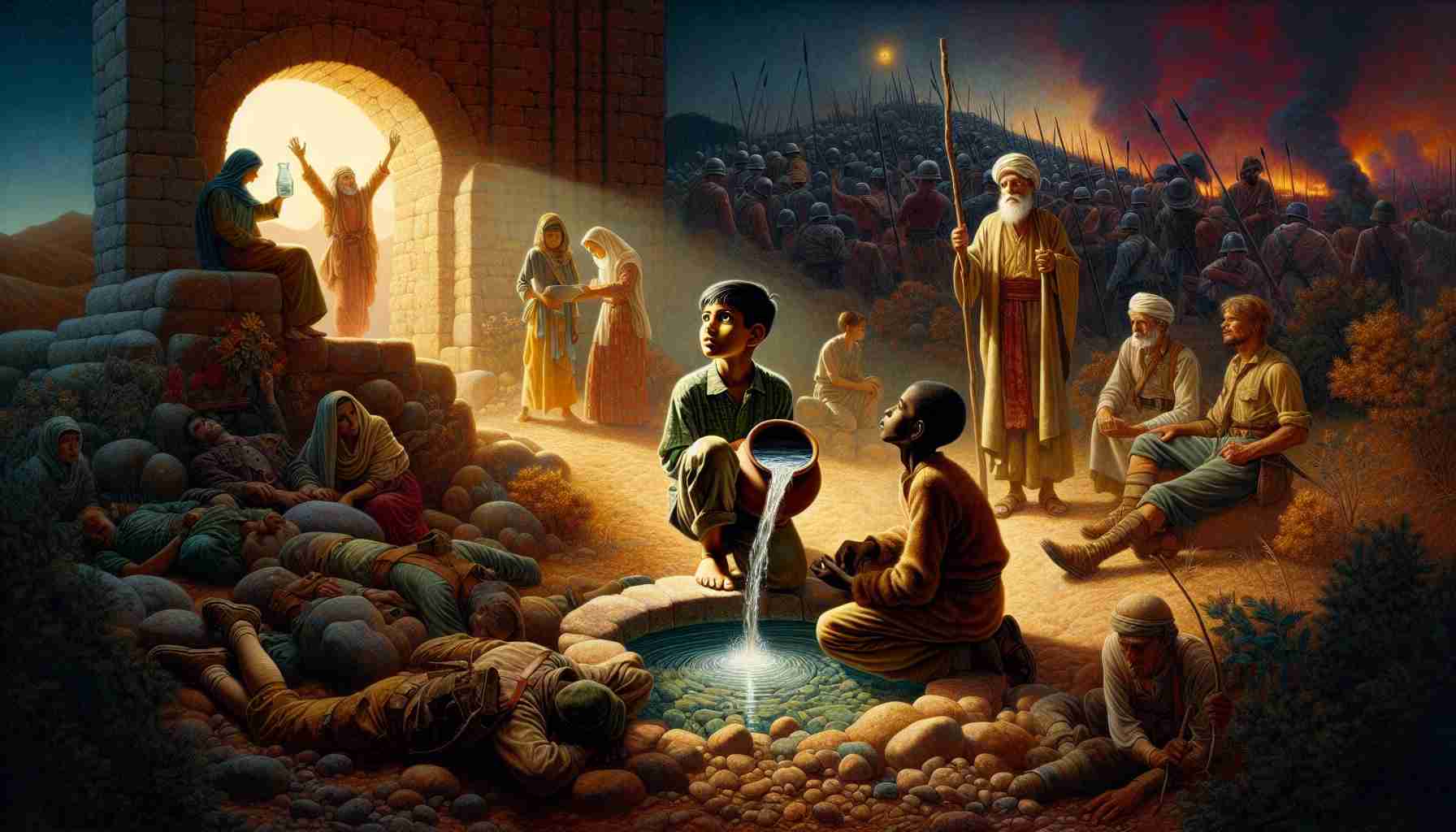

My hands still ache when the wind turns cold. I suppose that’s the cost of a battle fought long ago, under the desert sun, lifted high in faith and pain. I wasn’t a commander or a fighter—I was Moses’ servant. My name is Hur, son of Caleb, and I stood beside him on the hill when Amalek came.
We didn’t expect war so soon after leaving Egypt. Our people—so many of us worn from slavery—had barely found our footing in freedom. We weren’t soldiers. We were former bricklayers, shepherds, mothers, and children. But still, Amalek attacked us. Cowards, they struck from behind, attacking the stragglers, the weak.
That morning, Moses called for Joshua—his young apprentice—and gave him the task of gathering men for battle. “Tomorrow, I will stand on the hilltop,” Moses said, “with the staff of God in my hand.”
When the sun rose, I climbed beside Moses and Aaron—his brother and Israel’s High Priest. Below, the young men of Israel clashed with Amalek’s warriors. It wasn’t a fair fight, but we saw something strange: as long as Moses held his arms raised, staff reaching to the heavens, Israel began to win. But when his arms sagged, Amalek pushed forward.
I remember the moment the truth sank in. We weren’t just fighting with swords. This was a battle of faith.
Moses grew tired quickly. He was an old man—strong in spirit, yes—but his muscles trembled with the weight of that staff. Without a word, Aaron and I found a large stone and placed it behind him so he could sit. Then we each took a place at his side and held up his arms—me on one side, Aaron on the other.
I didn’t expect it to hurt so much. His arms were heavy, and the heat was cruel, but none of that mattered. The survival of our people depended on one thing: keeping Moses’ arms raised to God.
We stood until the sun set over the horizon, and the last cry of Amalek faded into silence. Joshua returned with the good news—Amalek had fallen.
But God wasn’t finished. That evening, Moses built an altar and gave it a name: “God is my banner.” And then he told me something I never forgot. God had said, “I will erase the memory of Amalek from under Heaven. Write this in a scroll and tell it to Joshua, for I will be at war with Amalek from generation to generation.”
It baffled me at first—if Amalek was defeated, why speak of them in the future?
Years later, I understood. God wasn’t just fighting a nation. He was fighting an idea. Amalek attacked the innocent. Amalek struck when we were vulnerable. They mocked holiness and kindness.
We had won the battle, yes. But we were also given a mission: to remember what it means to stand against cruelty, and to raise tired hands toward Heaven—even when it hurts.
And that is why, all these years later, my hands still remember.
My hands still ache when the wind turns cold. I suppose that’s the cost of a battle fought long ago, under the desert sun, lifted high in faith and pain. I wasn’t a commander or a fighter—I was Moses’ servant. My name is Hur, son of Caleb, and I stood beside him on the hill when Amalek came.
We didn’t expect war so soon after leaving Egypt. Our people—so many of us worn from slavery—had barely found our footing in freedom. We weren’t soldiers. We were former bricklayers, shepherds, mothers, and children. But still, Amalek attacked us. Cowards, they struck from behind, attacking the stragglers, the weak.
That morning, Moses called for Joshua—his young apprentice—and gave him the task of gathering men for battle. “Tomorrow, I will stand on the hilltop,” Moses said, “with the staff of God in my hand.”
When the sun rose, I climbed beside Moses and Aaron—his brother and Israel’s High Priest. Below, the young men of Israel clashed with Amalek’s warriors. It wasn’t a fair fight, but we saw something strange: as long as Moses held his arms raised, staff reaching to the heavens, Israel began to win. But when his arms sagged, Amalek pushed forward.
I remember the moment the truth sank in. We weren’t just fighting with swords. This was a battle of faith.
Moses grew tired quickly. He was an old man—strong in spirit, yes—but his muscles trembled with the weight of that staff. Without a word, Aaron and I found a large stone and placed it behind him so he could sit. Then we each took a place at his side and held up his arms—me on one side, Aaron on the other.
I didn’t expect it to hurt so much. His arms were heavy, and the heat was cruel, but none of that mattered. The survival of our people depended on one thing: keeping Moses’ arms raised to God.
We stood until the sun set over the horizon, and the last cry of Amalek faded into silence. Joshua returned with the good news—Amalek had fallen.
But God wasn’t finished. That evening, Moses built an altar and gave it a name: “God is my banner.” And then he told me something I never forgot. God had said, “I will erase the memory of Amalek from under Heaven. Write this in a scroll and tell it to Joshua, for I will be at war with Amalek from generation to generation.”
It baffled me at first—if Amalek was defeated, why speak of them in the future?
Years later, I understood. God wasn’t just fighting a nation. He was fighting an idea. Amalek attacked the innocent. Amalek struck when we were vulnerable. They mocked holiness and kindness.
We had won the battle, yes. But we were also given a mission: to remember what it means to stand against cruelty, and to raise tired hands toward Heaven—even when it hurts.
And that is why, all these years later, my hands still remember.